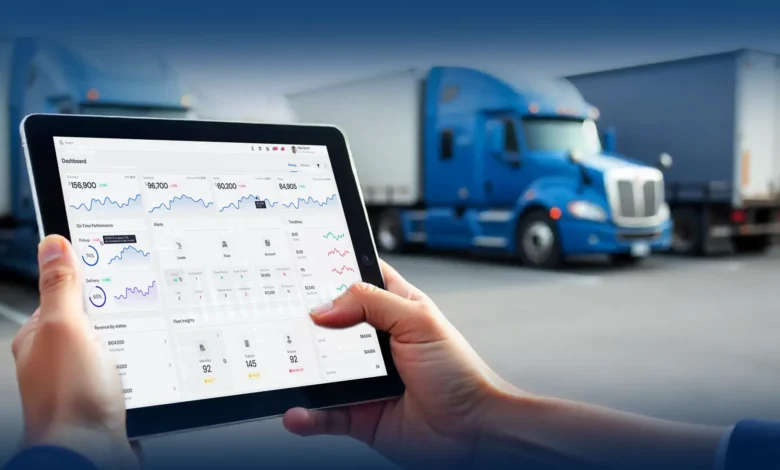Smart data, lower costs: how to run a profitable fleet operation

Effective management and control over logistics can be challenging, especially considering how competitive today’s business environment can be. Ensuring every asset in a fleet is used optimally is vital for reducing costs and increasing productivity. One way companies are successfully achieving this goal is by using advanced trailer tracking technology. Integrating trailer data into a comprehensive, fully digital fleet management solution provides increased visibility and crucial insights. Such data allows fleet operators to spot inefficiencies, schedule smarter, and ultimately improve profitability and fleet longevity.
The importance of data-driven decisions
Businesses operating fleets face enormous pressure to maintain profitability, efficiency, and compliance requirements. Fleet operators are constantly asked to provide proof of improvements in fuel consumption, measured maintenance expenditures, and scheduling efficiencies. Leveraging smart data generated from fleets enables operators to make informed, data-driven decisions. Real-time data allows operators to pinpoint critical areas that need adjustments such as route planning, vehicle utilisation, driver behaviours, and fuel use. By closely monitoring and making strategic decisions based on this information, fleet operators can substantially reduce costs and impact positively on their overall profitability. Using data effectively involves collecting and analysing large volumes of information that offer real-time insights into all fleet activities. Smart data provides precision tracking and monitoring, allowing managers to improve driver performance, vehicle conditions, and asset usage. Understanding and managing these insights transforms fleet management from guesswork into accurate, predictable planning. The ability to identify and implement real-time fleet improvements enables quick response and adjustment, significantly influencing operational cost-effectiveness over time.
The role of tracking technology in cost reduction
Modern technologies have significantly changed the manner in which fleet operations are managed. The adoption of precise GPS-enabled tracking systems, for instance, has had notable impacts on operational efficiency. Equipping vehicles with these advanced fleet tracking devices gives fleet managers a real-time overview of vehicle location, fuel consumption patterns, driver behaviour, and maintenance requirements. Detailed data analysis from these systems allows operators to understand trends, optimise routes, reduce downtime, and improve overall vehicle lifespan and efficiency. As a result, businesses realise significant savings from reduced fuel usage, fewer hours spent idling, better routing, and lower maintenance costs.
Furthermore, comprehensive tracking data supports safer driving habits which can lead to insurance premium reductions. Monitoring driving styles provides insights into aggressive braking, idling habits, speed limit adherence, and acceleration patterns. Managers can set targeted training programmes to promote safer driving behaviours and reduce potential accidents and insurance claims, further enhancing profitable fleet operations. Additionally, accurate and detailed reports improve compliance management and alleviate possible financial repercussions due to non-compliance with legal and regulatory requirements.
Maintenance scheduling and predictive analytics
Predictive analytics derived from smart data metrics is another strong asset in fleet operation management. Monitoring vital vehicle statistics and historical maintenance logs allows predictive models to forecast potential repair and maintenance needs with high accuracy. With smart data, maintenance shifts from reactive, unplanned repairs that can disable operations, to proactive scheduling and maintenance interventions. This approach significantly reduces downtime, unexpected repair costs, and disruption to fleet operations, leading to much more cost-effective management strategies overall. Advanced analytics enable operators to schedule fleet maintenance based on actual vehicle usage and conditions instead of merely mileage or standardized time intervals. In turn, operators experience optimized servicing intervals, reduced vehicle downtime, and improved asset life-cycle management. Smart data-driven predictive analytics greatly help to identify issues before they become serious, avoiding costly vehicle breakdowns and minimizing the fleet’s overall operational expenses.
Sustainable efficiency through fleet intelligence
Sustainability has emerged as a critical element within fleet operations, reflecting both corporate responsibility and compliance with increasingly stringent environmental regulations. Smart data provides insights that help fleet managers systematically reduce emissions and environmental impact by improving routing, minimising idling impacts, and accurately monitoring fuel consumption. Organisations can easily determine the effectiveness of their environmental initiatives by gaining access to real-time data on fleet activities and emission levels. When fleet activities are managed in a data-driven manner, businesses not only cut costs but also reinforce their commitment towards environmental responsibility. Improvement in vehicle utilisation, scheduling, and routing indirectly leads to reduced greenhouse gas emissions and a significantly lower carbon footprint. This, in turn, positively impacts the company’s public image, meets regulatory requirements, and assures long-term sustainability of the fleet operation as a whole.




